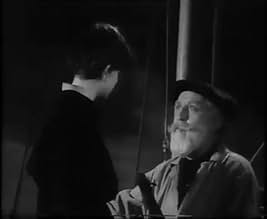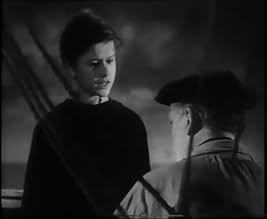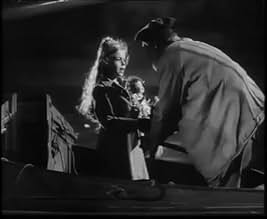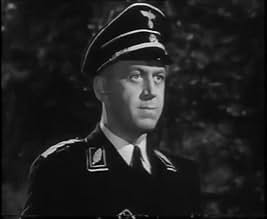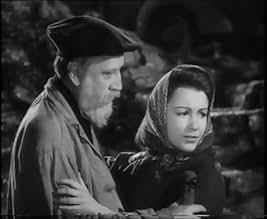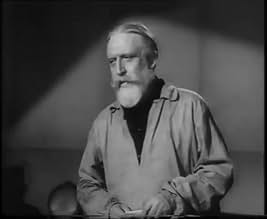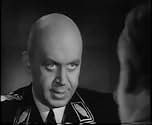While traveling in France during the Nazi invasion of 1940, an Englishman is entrusted with the care of a group of refugee children.While traveling in France during the Nazi invasion of 1940, an Englishman is entrusted with the care of a group of refugee children.While traveling in France during the Nazi invasion of 1940, an Englishman is entrusted with the care of a group of refugee children.
- Nominated for 3 Oscars
- 4 wins & 3 nominations total
Rudolph Anders
- Lieutenant
- (as Robert O.Davis)
- Director
- Writers
- All cast & crew
- Production, box office & more at IMDbPro
Featured reviews
Monty Woolley is in France, fly fishing, when the radio announces the English evacuation of Dunkirk. Woolley had come to forget; his son, a flier in the RAF, is dead, and his attempts to serve in some capacity have been turned down. So here he is, occupying himself. But the other guest, an Englishwoman, at the inn he is staying at has to go elsewhere. She entrusts Woolley with her two children to get them back to England safely. They start off, but Germans slow them down. Somehow, they pick up other children to get to safety, and Ann Baxter, and even Dalio. But when they make it to the Channel, they are captured by Otto Preminger playing one of his Nasty Nazis, who is convinced that Woolley is an English spy using the children as a cover.
Is this a serious movie, or a fable? Or is there necessarily a difference between the two? Wooley gives a performance that goes from guarded and grumpy to open as he comes to realize his service is to take care of the children he has, largely unwittingly, been charged with. When Preminger prods him on what he means to do with this gaggle of children, he expounds on his decision to send them to connections in America. But had he thought this out earlier, or has it just occurred to him? Is this a well conceived idea, or just more English muddling through? I like to believe the latter, but would it make any difference to this tale of decency under threat?
With Roddy McDowall, J. Carrol Naish, Jill Esmond, and Peggy Ann Garner.
Is this a serious movie, or a fable? Or is there necessarily a difference between the two? Wooley gives a performance that goes from guarded and grumpy to open as he comes to realize his service is to take care of the children he has, largely unwittingly, been charged with. When Preminger prods him on what he means to do with this gaggle of children, he expounds on his decision to send them to connections in America. But had he thought this out earlier, or has it just occurred to him? Is this a well conceived idea, or just more English muddling through? I like to believe the latter, but would it make any difference to this tale of decency under threat?
With Roddy McDowall, J. Carrol Naish, Jill Esmond, and Peggy Ann Garner.
More than a few movie stars have learned their craft through the Yale School of Acting, including Meryl Streep, Paul Newman, and Sigourney Weaver. But not many professors teaching at the Ivy League university have become successful Hollywood actors. Monty Woolley was one of the most noteworthy dramatic instructors at Yale to make a go in movies. He earned the first of two Academy Awards Best Actor nominations for his role in August 1942's "The Pied Piper," as a Brit on a fishing vacation who finds himself leading a group of youngsters to freedom. The movie so impressed the Academy members they nominated it for Best Picture.
Nicknamed "The Beard," Woolley, a Manhattan native, taught English and Drama at Yale before directing Broadway plays beginning in 1929, followed by small roles in Hollywood starting in 1936. In his first film lead, 1942 "The Man Who Came to Dinner," Woolley re-enacted his stage role of the same name. "The Pied Piper" came next, causing him to admire his own acting talents, but was even more proud of his trademark beard. "Take the beards away from Santa Claus and Bluebeard and what do you have?" asked Woolley. "Nothing but a pair of middle-aged, overstuffed bores." In "The Pied Piper," Woolley, 64, plays Howard, an Englishman visiting France near the border of Switzerland when the Germans invade. Anxious to return home, he reluctantly takes his hosts' two children, Ronnie (Roddy McDowall) and Sheila (Peggy Ann Garner) to their relatives in England. On his way via train, Howard and company run into a number of obstacles while collecting other children along the way. One child includes the Jewish niece of Nazi officer Major Diessen (Otto Preminger), who wants Howard, who's his prisoner, to take her out of France. The Nunnally Johnson-written script adapted from Nevil Shute's 1942 novel of the same name emphasizes British patriotism as well as a critique on Nazi cruelty. The negative criticism of the Nazis in the movie would never have been permitted by the Hays Office censors before Pearl Harbor, but six months after the Japanese attack the honest portrayal of the German government was allowed.
Woolley had many fans, with an equal amount of critics who didn't particularly appreciate his brand of acting. Critic Erik Beck harped on his on-screen demeanor, claiming, "His acting seems to consist of standing around, blustering, and generally acting irritated. Wooley isn't a bad actor, but he's just bluster." Film reviewer Lura Grieve countered, "I have a soft spot for Monty Woolley, who was so good in films." His role as the guardian for the kids won him the Best Actor award from the National Board of Review.
"The Pied Piper" was the first film to star Otto Preminger, 37. The Austria-Hungary born director moved to the United States with his family at the outbreak of World War One. His first passion was the stage, both acting and directing. Handling four pictures in the 1930s, he increased his directing in the mid-1940s by producing a number of classics, including 1944 "Laura" and 1959 "Anatomy of a Murder." His performance as Major Diessen in "The Pied Piper" opened the eyes of the studios, pigeonholing him in a number roles playing German WW2 officers, including Colonel von Scherback in 1953's "Stalag 17." Besides the Academy Awards nominations for Best Picture and Woolley's Best Actor, "The Pied Piper" earned Edward Cronjager his third of seven Best Cinematographer (Black-and-White) nominations.
Nicknamed "The Beard," Woolley, a Manhattan native, taught English and Drama at Yale before directing Broadway plays beginning in 1929, followed by small roles in Hollywood starting in 1936. In his first film lead, 1942 "The Man Who Came to Dinner," Woolley re-enacted his stage role of the same name. "The Pied Piper" came next, causing him to admire his own acting talents, but was even more proud of his trademark beard. "Take the beards away from Santa Claus and Bluebeard and what do you have?" asked Woolley. "Nothing but a pair of middle-aged, overstuffed bores." In "The Pied Piper," Woolley, 64, plays Howard, an Englishman visiting France near the border of Switzerland when the Germans invade. Anxious to return home, he reluctantly takes his hosts' two children, Ronnie (Roddy McDowall) and Sheila (Peggy Ann Garner) to their relatives in England. On his way via train, Howard and company run into a number of obstacles while collecting other children along the way. One child includes the Jewish niece of Nazi officer Major Diessen (Otto Preminger), who wants Howard, who's his prisoner, to take her out of France. The Nunnally Johnson-written script adapted from Nevil Shute's 1942 novel of the same name emphasizes British patriotism as well as a critique on Nazi cruelty. The negative criticism of the Nazis in the movie would never have been permitted by the Hays Office censors before Pearl Harbor, but six months after the Japanese attack the honest portrayal of the German government was allowed.
Woolley had many fans, with an equal amount of critics who didn't particularly appreciate his brand of acting. Critic Erik Beck harped on his on-screen demeanor, claiming, "His acting seems to consist of standing around, blustering, and generally acting irritated. Wooley isn't a bad actor, but he's just bluster." Film reviewer Lura Grieve countered, "I have a soft spot for Monty Woolley, who was so good in films." His role as the guardian for the kids won him the Best Actor award from the National Board of Review.
"The Pied Piper" was the first film to star Otto Preminger, 37. The Austria-Hungary born director moved to the United States with his family at the outbreak of World War One. His first passion was the stage, both acting and directing. Handling four pictures in the 1930s, he increased his directing in the mid-1940s by producing a number of classics, including 1944 "Laura" and 1959 "Anatomy of a Murder." His performance as Major Diessen in "The Pied Piper" opened the eyes of the studios, pigeonholing him in a number roles playing German WW2 officers, including Colonel von Scherback in 1953's "Stalag 17." Besides the Academy Awards nominations for Best Picture and Woolley's Best Actor, "The Pied Piper" earned Edward Cronjager his third of seven Best Cinematographer (Black-and-White) nominations.
Finally tracked down a tape of this 1942 filming of the Nevil Shute novel, and found it quite enjoyable. Monty Woolley is perfect in the lead, a crusty Brit on vacation in Switzerland who is persuaded, with WW2 imminent, to take a friend's two small children to safety in England. Other children join the group along the way, with the German army always around the next corner, leading to an exciting finale when the group is captured by a Nazi commander, played by Otto Preminger. Among the children are Roddy MacDowall and Peggy Ann Garner, and Ann Baxter plays a French girl who helps Monty and his charges elude the Germans. (Baxter's French accent is very convincing.) Two gripes: (1) the film is shot mostly in darkness and in close quarters, and one yearns for the director to open it up. (2) The aforementioned Preminger is over the top in his portrayal - which was of course standard in 1942. But the movie is worth seeing, and worth releasing on DVD. Now to find another "lost" Nevil Shute movie: Landfall. Any suggestions?
10gsloring
I happened to be only 9 yrs old when I saw this movie for the first and only time in 1967 in Novato, CA ....Even I could understand it at that age...The 2 scenes I remember best were when Woolley's character:
1. ...Asked the Nazi officer if they've captured "him yet". The officer asks: "Who?", and Woolley replies firmly: "Hitler". Officer replies back in the negative, then Woolley defiantly but bravely yells back: ''BAHH!", then strides out of the officer's room.
2...Is brought another stray child to his group by someone unknown. A woman in Woolley's group tries to speak to the child to find out more. The child replies in an unknown language. Then the womans exclaims: "That sounds like Dutch!" (The reason I remember this so much is at age 9 I was shocked to see a war scene of an orphaned child speaking a foreign language. Where were the parents?, I thought. They must have been killed...)
I love "The Pied Piper." Although born in New York City, Monty Woolley strikes just the right note as a British tourist in Europe who gets roped into shepherding several French children, most of whose parents have been killed in the World War II, to safety in England or America. Woolley was nominated for a Best Actor Academy Award for this film, and the film itself was nominated for Best Picture also. The supporting cast, including Anne Baxter, Roddy McDowell, and Otto Preminger, are likewise superb.
It boggles my mind that this award-nominated film is not available on video is any form. Why is 20th Century Fox ignoring this worthy film while so many others of lesser quality are released? Heck, I'd even take it in the Fox Cinema Archives series, if nothing else.
It boggles my mind that this award-nominated film is not available on video is any form. Why is 20th Century Fox ignoring this worthy film while so many others of lesser quality are released? Heck, I'd even take it in the Fox Cinema Archives series, if nothing else.
Did you know
- TriviaThe original fairy tale was based on the disappearance of the children of the Dutch - not German - village of Hamelin. Although at the time they were thought to have vanished magically, it is now believed that the children left to join one of the Children's Crusades and were taken into slavery.
- GoofsThe seven-year-old German girl near the very end of the movie (at c.1:18 and at c.1:21) speaks German with a distinct American accent.
- Quotes
Howard: I have two small children!
Railroad official: At your age, monsieur, that is undoubtedly magnificent!
- ConnectionsFeatured in Minute Movie Masterpieces (1989)
- How long is The Pied Piper?Powered by Alexa
Details
- Release date
- Country of origin
- Languages
- Also known as
- Mannen med sälgpiporna
- Filming locations
- Production company
- See more company credits at IMDbPro
- Runtime1 hour 27 minutes
- Color
- Aspect ratio
- 1.37 : 1
Contribute to this page
Suggest an edit or add missing content

